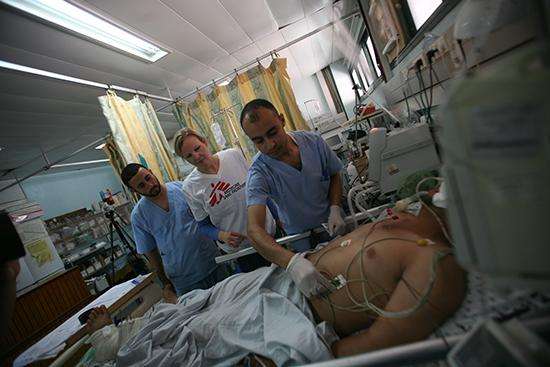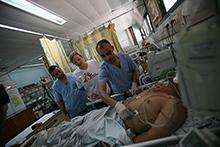MSF has begun offering surgical and postoperative services at Gaza City's Al-Shifa Hospital, akin to what teams were already doing at Nasser Hospital in Khan Younis.
On October 1, Doctors Without Borders/Médecins Sans Frontières (MSF) teams in Gaza, working in collaboration with the Ministry of Health (MoH), extended its reconstructive plastic surgery program at Nasser hospital in Khan Younis to Al-Shifa hospital in Gaza City.
MSF started its program in Khan Younis in 2010, after assessment teams determined that there was a need for reconstructive plastic surgery and post-operative care services at Nasser hospital. Since then, international MSF staff members—surgeons, nurses, and anesthetists—have traveled to Gaza several times each year to provide treatment to victims of trauma, domestic accidents, burns, and other injuries, and to help patients regain optimum use of their limbs.
Apart from a few private surgeons and clinics, Al-Shifa and Nasser hospitals are the only facilities in Gaza that provide reconstructive surgery. But demand and circumstance have meant they could not treat all those who needed care. The blockade implemented in 2007 resulted in over 450 patients having to wait from 12 to 18 months for their operations.
MSF performs two types of surgical intervention, plastic surgery and specialized hand surgery. Between January and September of this year, MSF teams performed 126 procedures, 63 percent of them on children.
Expanding Services
After the launch of the program at Al-Shifa on October 1, 18 surgical procedures were scheduled, more than 80 percent of them involving children.
“We hope that our work at Al-Shifa Hospital will increase the number of patients receiving treatment and reduce the Ministry of Health’s waiting list,” said Tommaso Fabbri, MSF's head of mission in Jerusalem.
“The aim is to share knowledge and skills, both in reconstructive surgery and postoperative care,” said Dr. Mahesh Prabhu, an MSF surgeon in Gaza. “The first two days of the program were devoted to preoperative examinations and then the following seven to the procedures themselves.”
The Importance of Postoperative Care
After their operations, patients are routinely referred to an MSF clinic that specializes in postoperative care. In 2012, patients benefited from some 7,000 dressing and physiotherapy sessions. Physiotherapy plays a key role in rehabilitation treatment for patients, as it helps them to heal more quickly, suffer less pain, and regain as much use of their limbs as possible.
There is a room set aside for hand physiotherapy in the MSF clinic. Most patients are children. MSF teams at the clinic also treat patients referred by the MoH and other facilities.
In addition to the surgery program, in June 2013 MSF worked with the MoH to provide intensive care training at Al-Shifa hospital for doctors from several Gaza hospitals. And, in September 2013, MSF donated enough insulin to last the MoH one month after a supply problem resulted in a shortage.
MSF programs in the Palestinian Territories also include medical and mental health programs in Nablus, Hebron, and East Jerusalem. The organization has been working in the West Bank since 1989 and in Gaza since 2000.





